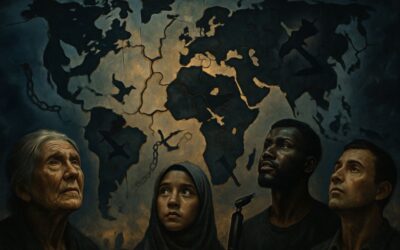Delve into the tragic tale of the Siege of Troy, a haunting reminder of the futility of war. Explore real-life examples that emphasize the importance of understanding the costs of conflict and how to work towards a more peaceful world.
Dear readers, there are moments in history when the triumphant sounds of victory are overshadowed by the haunting echoes of tragedy. The Siege of Troy stands as an enduring testament to the futility of war, a stark reminder that no matter the cause, the toll of conflict is immeasurable.
The Siege of Troy: A Brief Overview
The story of the Siege of Troy is a timeless epic, immortalized in Homer’s “Iliad.” It recounts the ten-year-long conflict between the Greeks and Trojans, triggered by the abduction of Helen, the most beautiful woman in the world. While the Greeks ultimately claimed victory with the famous Trojan Horse, the cost was staggering.
Real-Life Lessons in Tragedy
- The Destruction of a City: Troy, a once-great city, lay in ruins. This mirrors real-life examples of cities devastated by war, such as Aleppo during the Syrian Civil War.
- Human Toll: Countless lives were lost on both sides, a stark reminder of the human cost of conflict. The Battle of Stalingrad during World War II claimed over two million lives.
- The Lost Generation: The Trojan War left an entire generation scarred and forever changed, reflecting how wars impact societies for generations, like the impact of World War I on Europe.
- Destruction of Culture: The loss of Troy’s rich cultural heritage echoes the destruction of historical sites like Palmyra in Syria.
- Long-lasting Consequences: The consequences of the war extended far beyond its end, leading to further conflicts and the loss of great heroes like Achilles.
The Futility of War
War, no matter the cause, carries a heavy burden of suffering and destruction. It disrupts the lives of innocent civilians, shatters communities, and erases the beauty of culture and history. The Siege of Troy serves as a poignant reminder that victory on the battlefield often comes at a tremendous cost.
Taking Action for Peace
As we reflect on the tragedy of the Siege of Troy, it’s imperative that we use this knowledge to strive for a more peaceful world. Support organizations working towards conflict resolution, advocate for diplomatic solutions to international crises, and engage in dialogues that promote understanding and empathy.
Let us not forget the tears shed and the lives lost in the name of war. Instead, let us work towards a world where victories are measured not in battles won, but in conflicts averted and in the peace we secure for future generations. The Siege of Troy reminds us that the true triumph lies in the pursuit of peace.
Why Should You Care?
Learning about the Siege of Troy and the tragedy of war is essential because it reminds us of the devastating consequences of armed conflict. Understanding the human toll, cultural losses, and long-lasting impact of wars underscores the urgency of promoting peace and diplomacy in today’s world. It serves as a solemn call to action for individuals to contribute to a more peaceful future.
Key Takeaways:
- Tragedy of Conflict: The Siege of Troy is a haunting reminder of the immense tragedy and suffering caused by war.
- Real-Life Parallels: Numerous real-life examples mirror the destruction, human toll, and cultural losses seen in the Trojan War.
- Generational Impact: Wars can scar societies for generations, affecting the lives of innocent civilians.
- Cultural Heritage: Conflict can lead to the irreplaceable loss of cultural heritage, impacting future generations.
- Consequences Beyond Victory: Even victorious wars can lead to further conflicts and the loss of heroes and leaders.
- Futility of War: Regardless of the cause, war carries a heavy burden of suffering and destruction.
- Cost of Victory: The price of victory often includes lives lost, communities shattered, and history erased.
- Call to Action: Understanding the tragedy of war should motivate individuals to support peace-building efforts and diplomatic solutions.
Keywords and Definitions:
- Siege of Troy: A legendary conflict described in Homer’s “Iliad” where Greek forces besieged the city of Troy.
- Futility of War: The idea that war often leads to immense suffering and destruction without achieving lasting solutions.
- Human Toll: The human cost of conflict, including casualties, displacement, and psychological trauma.
- Cultural Heritage: The cultural and historical legacy of a society, including art, artifacts, and traditions.
- Generational Impact: The long-lasting consequences of wars that affect multiple generations.
- Diplomacy: The use of negotiation and dialogue to resolve conflicts and disputes peacefully.
- Conflict Resolution: Methods and strategies aimed at ending conflicts and promoting reconciliation.
- Peace-building: Actions and initiatives that work to prevent conflicts, address their root causes, and create conditions for lasting peace.
- Victory in War: Achieving the goals of a military campaign, often at a high cost.
- Cultural Losses: Irreplaceable damage to a society’s cultural heritage due to conflict or disaster.
Frequently Asked Questions:
- Was the Siege of Troy a real historical event? While the Trojan War is considered a historical event by some scholars, the exact details remain debated. The story is primarily based on mythology.
- What are some modern-day examples of cultural heritage loss due to war? Examples include the destruction of ancient sites in Syria and Iraq during recent conflicts and the loss of cultural artifacts in conflicts around the world.
- Can war ever be justified? The justification of war is a complex ethical and political issue. Some argue that self-defense may justify armed conflict, while others advocate for peaceful alternatives.
Myth Buster:
- Myth: War is an effective solution to conflicts. Reality: War often leads to devastating consequences, and peaceful alternatives should be explored first.
- Myth: Victory in war is worth any cost. Reality: The human and cultural costs of war should be carefully considered, and alternative solutions should be prioritized.
Let’s Talk: Discussion Questions
- How can individuals contribute to promoting peace and conflict resolution in their communities?
- Are there historical events in your region that reflect the tragedy of war and its impact on society?
- What lessons can we draw from the Siege of Troy to prevent future conflicts and promote diplomacy?
Share your thoughts on the tragedy of war and its implications for our world today. Let’s engage in a meaningful conversation about the importance of peace and conflict resolution. Your insights can help shape a more peaceful future for all.










0 Comments